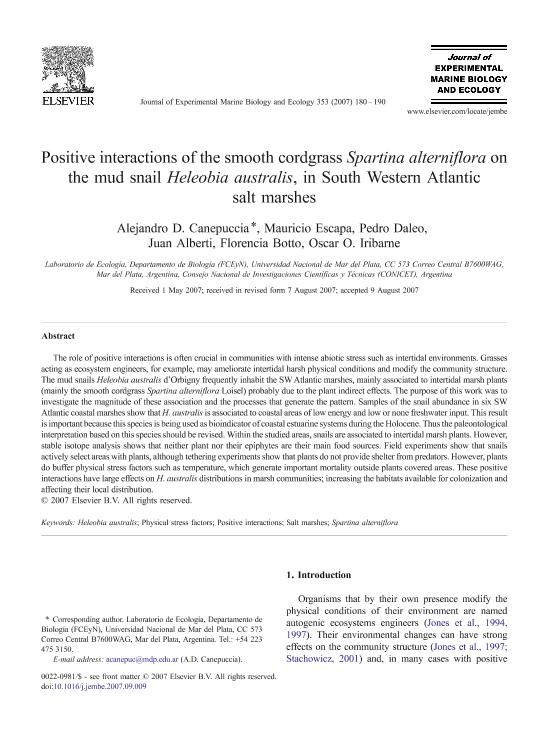Artículo
Positive interactions of the mooth cordgrass Spartina alterniflora on the mud snail Heleobia australis, in southwestern Atlantic salt marshes
Canepuccia, Alejandro Daniel ; Escapa, Carlos Mauricio
; Escapa, Carlos Mauricio ; Daleo, Pedro
; Daleo, Pedro ; Alberti, Juan
; Alberti, Juan ; Botto, Florencia
; Botto, Florencia ; Iribarne, Oscar Osvaldo
; Iribarne, Oscar Osvaldo
 ; Escapa, Carlos Mauricio
; Escapa, Carlos Mauricio ; Daleo, Pedro
; Daleo, Pedro ; Alberti, Juan
; Alberti, Juan ; Botto, Florencia
; Botto, Florencia ; Iribarne, Oscar Osvaldo
; Iribarne, Oscar Osvaldo
Fecha de publicación:
12/2007
Editorial:
Elsevier Science
Revista:
Journal of Experimental Marine Biology and Ecology
ISSN:
0022-0981
Idioma:
Inglés
Tipo de recurso:
Artículo publicado
Clasificación temática:
Resumen
The role of positive interactions is often crucial in communities with intense abiotic stress such as intertidal environments. Grasses acting as ecosystem engineers, for example, may ameliorate intertidal harsh physical conditions and modify the community structure.
The mud snails Heleobia australis d'Orbigny frequently inhabit the SW Atlantic marshes, mainly associated to intertidal marsh plants (mainly the smooth cordgrass Spartina alterniflora Loisel) probably due to the plant indirect effects. The purpose of this work was to investigate the magnitude of these association and the processes that generate the pattern. Samples of the snail abundance in six SW Atlantic coastal marshes show that H. australis is associated to coastal areas of low energy and low or none freshwater input. This result is important because this species is being used as bioindicator of coastal estuarine systems during the Holocene. Thus the paleontological interpretation based on this species should be revised. Within the studied areas, snails are associated to intertidal marsh plants. However, stable isotope analysis shows that neither plant nor their epiphytes are their main food sources. Field experiments show that snails actively select areas with plants, although tethering experiments show that plants do not provide shelter from predators. However, plants do buffer physical stress factors such as temperature, which generate important mortality outside plants covered areas. These positive interactions have large effects on H. australis distributions in marsh communities; increasing the habitats available for colonization and affecting their local distribution.
Palabras clave:
Saltmarsh
,
Positive Interaction
,
Mud Snail
Archivos asociados
Licencia
Identificadores
Colecciones
Articulos(CCT - MAR DEL PLATA)
Articulos de CTRO.CIENTIFICO TECNOL.CONICET - MAR DEL PLATA
Articulos de CTRO.CIENTIFICO TECNOL.CONICET - MAR DEL PLATA
Articulos(IADO)
Articulos de INST.ARG.DE OCEANOGRAFIA (I)
Articulos de INST.ARG.DE OCEANOGRAFIA (I)
Articulos(IIMYC)
Articulos de INSTITUTO DE INVESTIGACIONES MARINAS Y COSTERAS
Articulos de INSTITUTO DE INVESTIGACIONES MARINAS Y COSTERAS
Citación
Canepuccia, Alejandro Daniel; Escapa, Carlos Mauricio; Daleo, Pedro; Alberti, Juan; Botto, Florencia; et al.; Positive interactions of the mooth cordgrass Spartina alterniflora on the mud snail Heleobia australis, in southwestern Atlantic salt marshes; Elsevier Science; Journal of Experimental Marine Biology and Ecology; 353; 12-2007; 180-190
Compartir



